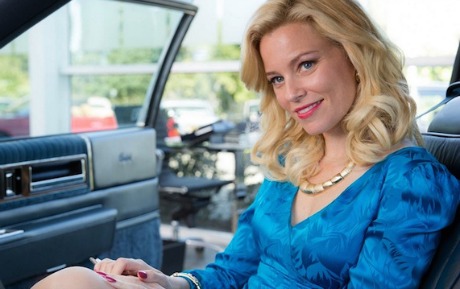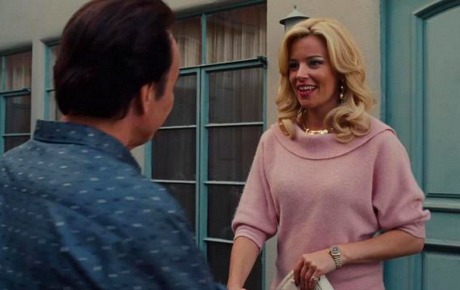The following David Thomson piece, titled “A Thing of Wonder,” was posted on Indiewire on 6.22.15: “There is a thing of wonder out there, and it is in an unexpected place, what we can only regard as an American entertainment movie. More than that, as I have returned to the picture over the last few weeks, I find that its audience is growing, as if enough people are saying, ‘You really should see Love & Mercy‘ — as if people still trust friends to talk to.

Elizabeth Banks in Love & Mercy.
“I like Bill Pohlad’s Love & Mercy very much, even if it drifts a little from time to time. I don’t know or really care whether it is a reliable portrait of the life and times of Brian Wilson. But I never thought to worry whether The Glenn Miller Story or New York, New York were ‘accurate.’ After all, people in American show business have gone there to escape the clinging and demeaning tests of fact and credibility.
“So I have always admired Brian Wilson’s harmonic head and assumed that he was an unstoppable mess. I am at ease with his part in the film being given over to Paul Dano and John Cusack (and even the director’s son), and I took it for granted in advance that Paul Giamatti would be deliciously vile and scary as Dr. Eugene Landy.
“But the thing of wonder is Elizabeth Banks who holds the film together with her extraordinary performance as Melinda Ledbetter.
“I know, there was a real Melinda; she is married to Wilson; they have five children; and I hope they are as happy as possible. But I’m not really interested in that. Instead, I want you to consider the creation and the potential of an attractive, very groomed blonde aged forty-one (the age of Elizabeth Banks now), who is a Cadillac saleswoman in Los Angeles.
“As Dr. Landy’s sinister research tells him (and us), Melinda has been around. She has loved and lost; and her character takes responsibility for that. I am not saying a word against Cadillacs (I have had only good experiences with them), but a woman of that age and look, and tightly groomed presentation, is a recognizable part of our grim commercial discourse. She lives too close to cliche to breathe easily.
“I think we know she moves cars, even if Brian Wilson is going to buy without so much as a test drive or any kind of sales pitch. We know from the way she grips her clipboard and pulls her skirt down a half inch when Brian wants to sit in the Cadillac with her with closed doors that she understands how easily a blonde Cadillac saleswoman with a buttered look that might be a Beach Boys girl twenty years later can be stereotyped. Her every gesture is decent, anxious but friendly, and every one of them is as telling as the astonishingly right clothes she wears. (Costumes by Danny Glicker.)

Elizabeth Banks in Love & Mercy.
“Melinda is not rich. She could not afford her own Cadillac, even if she drives one for work. She has clothes that are pretty, neat, stylish but budgeted and they speak to a woman of forty-one who has not had the kindness and hope drained out of her yet, and who is determined not to look fast or easy.
“Love & Mercy is an old-fashioned film, I know, about a woman saving a troubled man, not simply because she loves him, or likes his music, but because she possesses a nuanced detailed power of sympathy that waits for someone who needs rescue and who has taken up the odd challenge of selling Cadillacs as a way of finding him. There is something of Doris Day with Frank Sinatra in Young at Heart here, or of Elisabeth Shue with Nicolas Cage in Leaving Las Vegas.
“We are not accustomed to such generosity, or to stories that place so much value in love or such belief in rescue.
“Melinda could have been a sentimental stooge. She could have been a mere sexpot or a bimbo. But she has the moral force of Cary Grant saving Ingrid Bergman in Notorious, and it comes from the assurance with which Pohlad knows he only needs to photograph Melinda’s face thinking about Brian and the fairytale ordeal in which she must overcome the dread spirit of Eugene Landy. Her scenes are with Cusack (who is brilliant) and the chemistry in which their two ardent but wounded and uncertain faces dip closer together is deeply touching.
“It doesn’t matter who the real Melinda was, or what she was like, and there is no great need to set this in the context of Ms. Banks’ other work. Quite simply she is the heart of a very good film, and it is her beat and her gaze that drive it forward along with Brian Wilson‘s dreamed harmonies.
“I write this just because –- properly enough — people are praising Dano and Cusack. I share in that admiration. But Elizabeth Banks is the movie and I will never forget the shy battle of hope and caution she discovers in a forty-one-year-old face. Let’s not drag her down with premature talk of Oscars. She is far better than that.”
HE afterthought: If you’re a Love & Mercy fan, you know the truth of what Thomson has written here. And if you’re an Academy or SAG member, you should maybe think about passing this along to an Academy or SAG member who hasn’t read it or even, God forbid, seen the film. Just do that. Please. Thank you.









